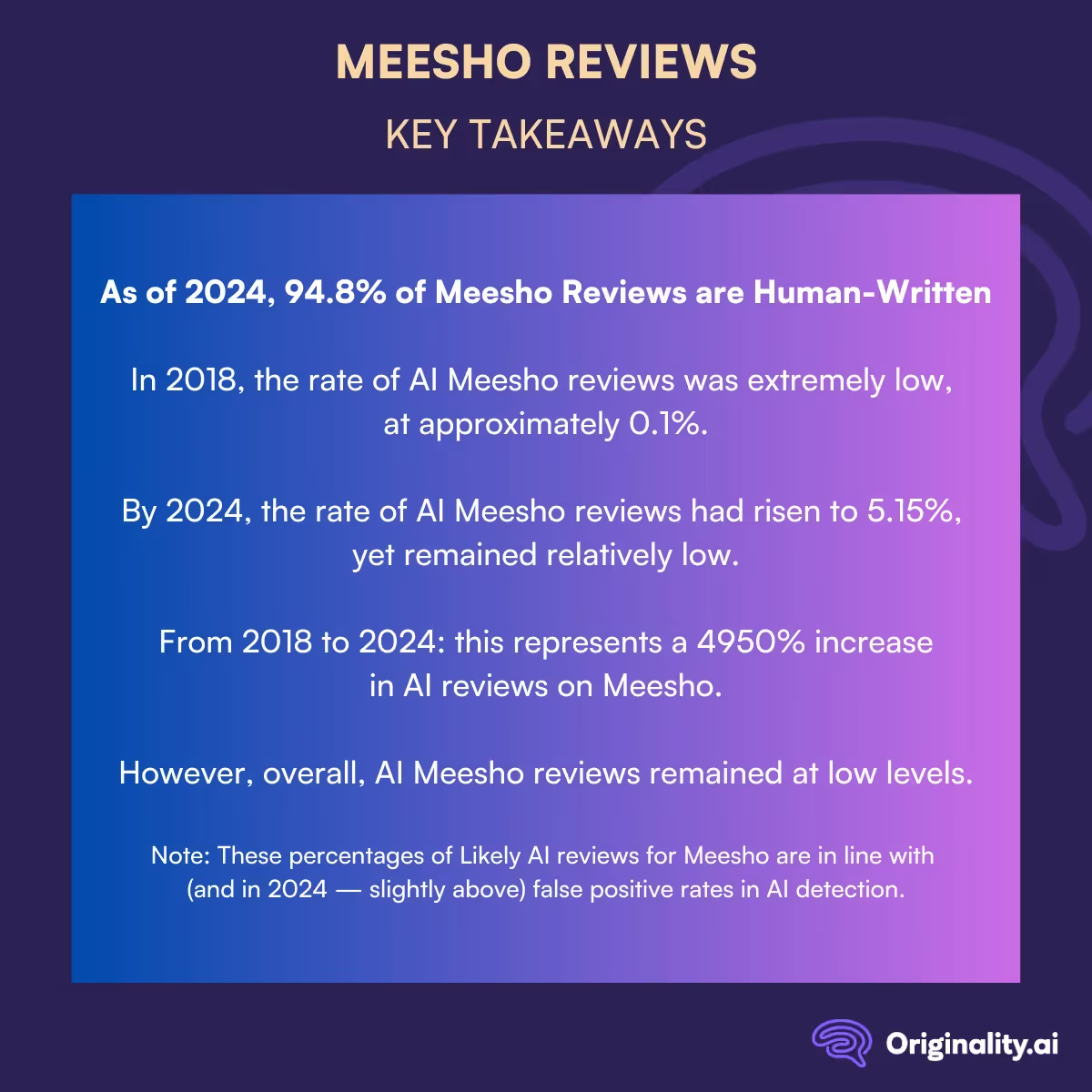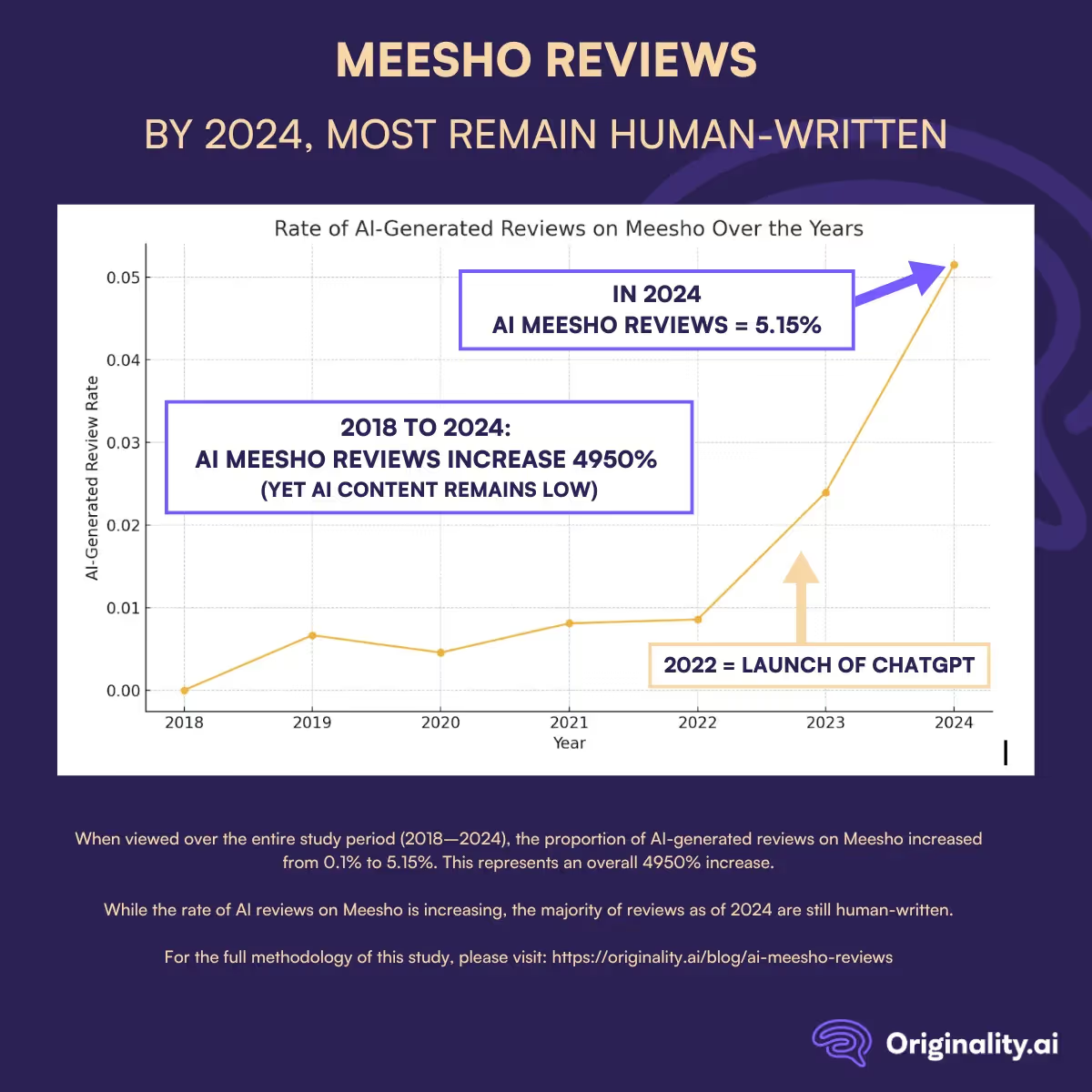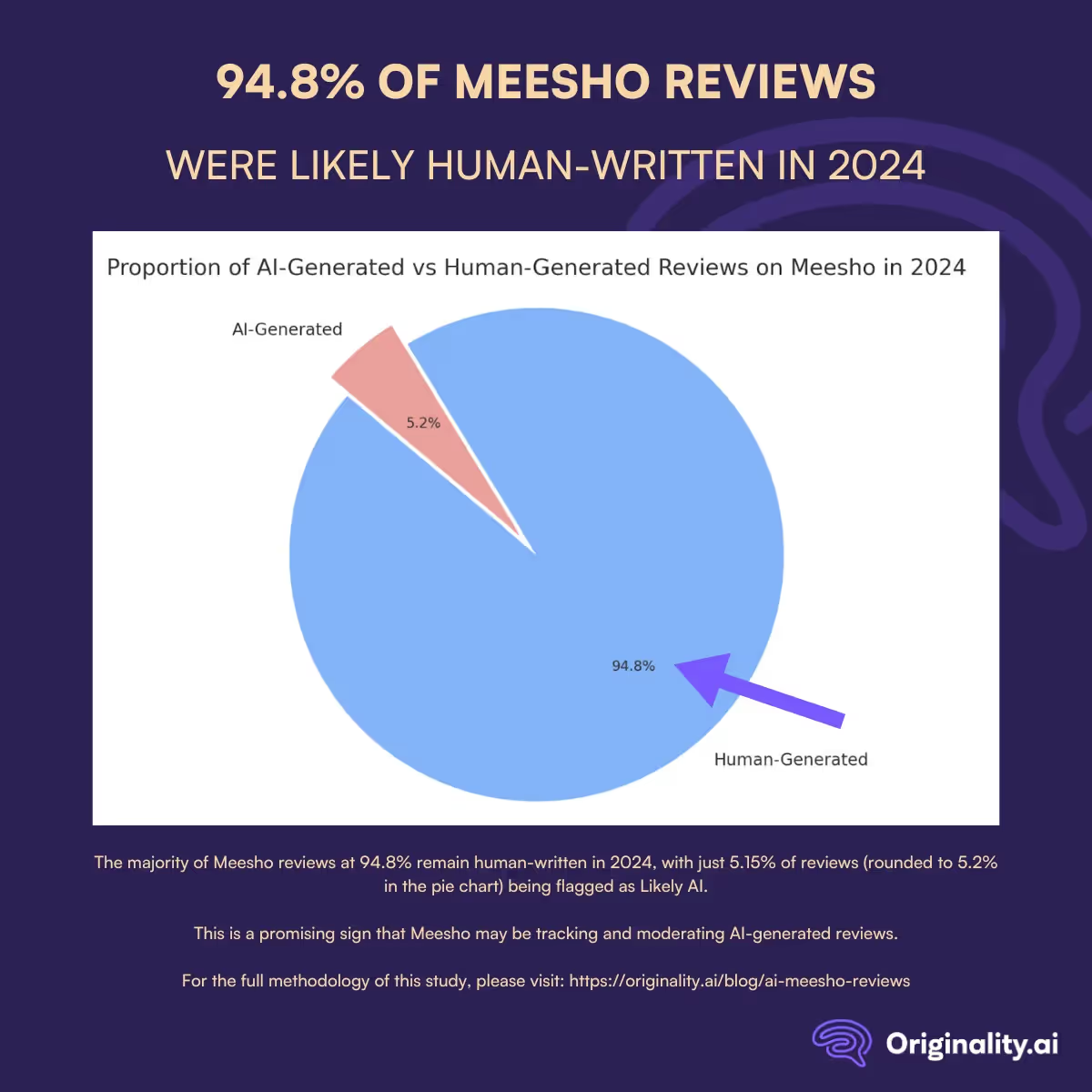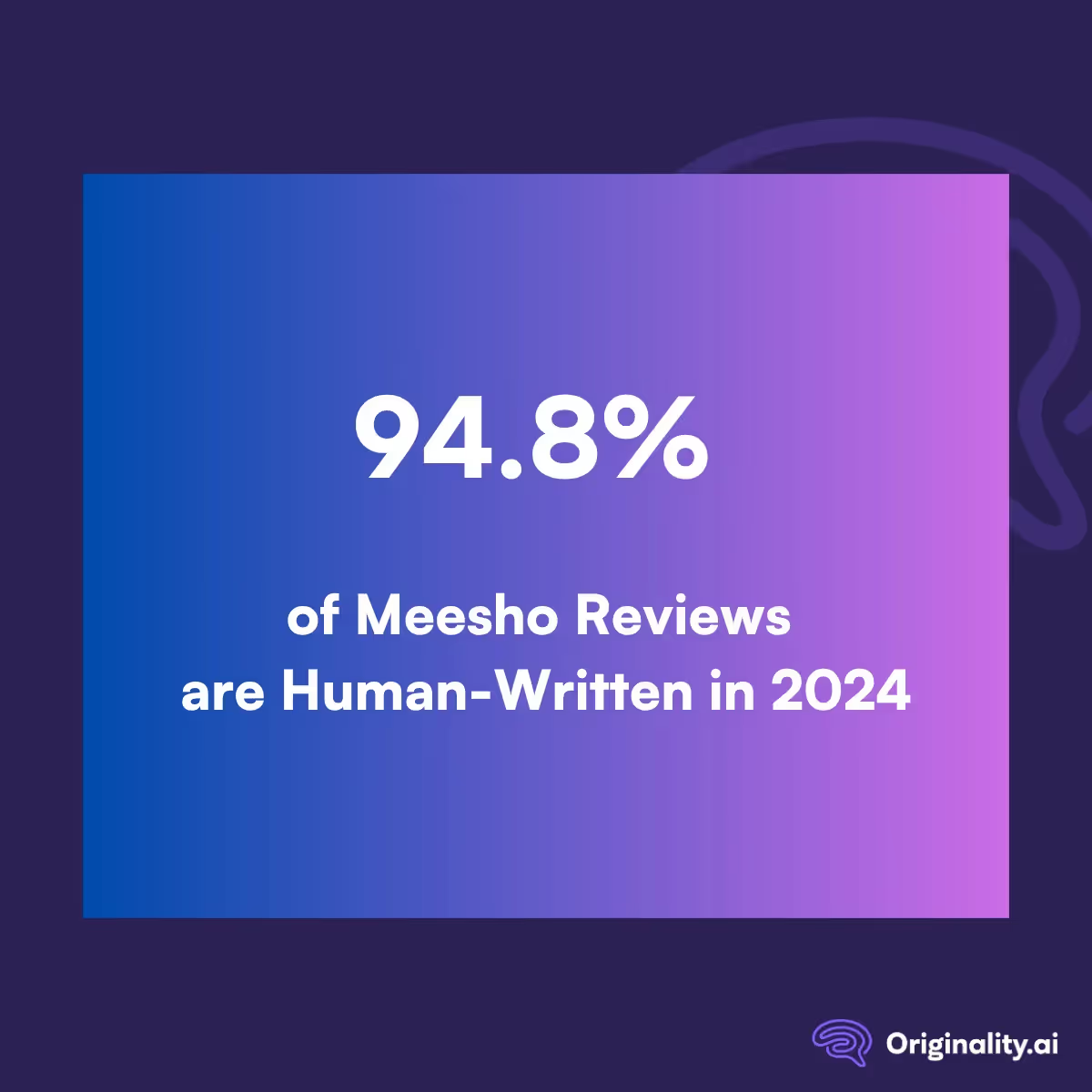User-generated content has become a cornerstone of e-commerce platforms like Meesho, as it offers consumers critical insights into products and can influence purchasing decisions.
Founded in 2015, Meesho has raised over $1 billion in funding and received 44.5 million web visits last month (as of May 2025), according to Crunchbase.
Its Android app has surpassed 500 million downloads on the Google Play Store, reflecting its massive user base and growing influence in the e-commerce landscape.
Considering the popularity of platforms like Meesho, the authenticity of online reviews across e-commerce apps is increasingly under scrutiny due to the proliferation of artificially generated content.
With the rise of large language models and AI content generation tools, distinguishing between genuine human reviews and AI-generated ones has become a pressing concern for consumers, businesses, and researchers alike, especially considering that humans struggle to identify AI content.
This study investigates the prevalence of AI reviews on Meesho, a rapidly growing e-commerce platform founded in India, known for its affordability and accessibility.
As Meesho expands its reach and user base, understanding the nature and authenticity of its review ecosystem is vital for maintaining consumer trust and platform credibility.
Through this analysis, we hope to provide insights into how AI reviews are shaping the shopping experience on Meesho.


The analysis of Meesho review data from 2018 to 2024 shows a clear and accelerating rise in the rate of AI-generated content, but it remains at a low level overall.
In 2018, the proportion of reviews flagged as AI-generated was just 0.1%, a minimal presence likely reflecting the early stages of generative AI usage.
Over time, however, this number has grown, culminating in a rate of 5.15% by 2024.
The trendline indicates that the growth of AI reviews was not linear but rather steepened in recent years, especially following the public release and mainstream adoption of advanced text generation tools such as ChatGPT and similar models. Further, it indicates a shift in how reviews are authored on the platform.
The increase depicted in the trendline (from 2018 to 2024) represents a 4950% relative growth in AI-generated reviews over the six-year period.
While this growth rate seems high initially, context is key. At its highest level in 2024, just 5.15% of reviews were flagged as AI-generated, which still represents a low level of AI content.
Interestingly, the total number of reviews also grew substantially across the same period. This implies that while AI review levels remain low, their volume is rising alongside Meesho’s overall growth.
As AI-generated content becomes easier to produce, platforms like Meesho may face increasing challenges in maintaining authentic user-generated content.
A note on false positives: In AI detection, false positives occur when human-written content is identified as AI (rates can vary by AI detection model and company). At Originality.ai, our Lite model has an under 1% false positive rate, and our Turbo model has an under 3% false positive rate. So, the rates of Likely AI content in Meesho reviews in this study are in line with (or slightly above in 2024) AI detection false positive rates.

As of 2024, 5.15% of Meesho reviews are likely AI, meaning that 94.8% of reviews are human-written.
Although the platform has seen a significant increase in AI-generated reviews since 2018, particularly after the launch of ChatGPT in 2022, the overall proportion remains low.
This suggests that Meesho continues to value authentic customer feedback as a key trust signal.
That said, Meesho must stay vigilant as generative AI tools become more advanced and widely used.
If they can manage this effectively, it could provide them with a strong competitive advantage over other platforms like Flipkart and Shein, which had higher levels of AI review content in 2024.

The data underscores the importance of ongoing surveillance and moderation in AI content within reviews of online platforms.
While platforms like Meesho and Myntra have relatively low levels of AI content, indicating that they may be moderating it; there is a rising trend in AI-generated reviews across other platforms, such as Flipkart, Shein, and Aliexpress, which suggests that the presence of AI has become a measurable and growing part of the ecosystem.
If left unaddressed overall, a rise in AI reviews could impact customer trust, product credibility, and ultimately, platform engagement. As such, proactive AI detection and clearer AI policies are necessary.
This study provides evidence of a sharp and sustained increase in AI-generated reviews on the Meesho shopping app between 2018 and 2024. While such content still represents a small proportion of overall reviews, the potential for its growth signals the need for immediate attention.
Left unchecked, AI-generated reviews could undermine the credibility of the platform and compromise user trust. For brands that are seeking ways to tackle and identify AI reviews, moderation tools such as the Originality.ai AI Checker can help maintain transparency.
To maintain the integrity of the review ecosystem, Meesho and similar platforms should:
Further research should also explore the motivations behind AI-generated content and its impact on consumer behavior.
As generative AI becomes an integral part of the digital landscape, proactive governance will be essential in ensuring that it enhances rather than erodes the online shopping experience.
Do you have concerns over whether a post or review you’re reading might be AI-generated? Use the Originality.ai AI detector to find out.
Read more about the impact of AI on online platforms:
This study followed a systematic approach to detect AI-generated reviews on the Meesho app. The original CSV dataset included fields such as review text, date, ID, score, and user engagement metrics.
Timestamps in Unix format were converted to human-readable dates using Python’s pandas library to enable time-based aggregation. The updated dataset was saved separately for consistency.
To identify AI-generated content, reviews with at least 50 words were scanned using the Originality.ai API via a custom Python script. Each scan returned an AI-likelihood score and a binary classification. Reviews that were too short or those with API errors were excluded, but logged.
The process included retry logic and saved progress every 500 reviews to prevent data loss. A new CSV file was created with original fields, AI scores, classifications, and scan status.
Final analysis included only valid and successfully scanned reviews, aggregated by year. Visualizations, including pie charts and trend graphs, highlighted the prevalence of AI-generated reviews.
The methodology ensured data quality, reproducibility, and reliable AI detection.

MoltBook may be making waves in the media… but these viral agent posts are highly concerning. Originality.ai’s study with our proprietary fact-checking software found that Moltbook produces 3 X more harmful factual errors than Reddit.